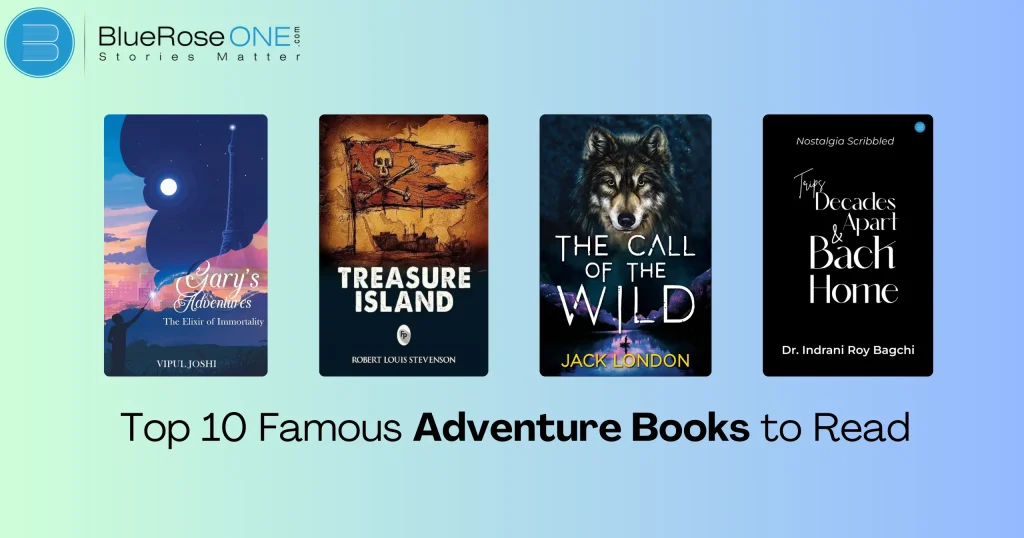
Top 10 Famous Adventure Books to Read for Book Lovers
Adventure books have always held a special place in the hearts of book lovers. They transport readers to thrilling and captivating worlds, where the ordinary becomes extraordinary and the impossible seems within reach. Whether it’s embarking on a treasure hunt, exploring uncharted territories, or braving perilous journeys, adventure books offer an exhilarating escape from reality. You may also like: Literary Fiction vs. Genre Fiction: Definition & Examples Here’s the list of top ten famous adventure books to read for Book Lovers: Treasure Island by Robert Louis Stevenson Heart of Darkness by Jospeh Conrad The Hobbit by J.R.R Tolkien The Call of the Wild by Jack London The Odyssey by Homer Moby-Dick by Herman Melville Wild Days Out an Adventurous Excursion by Mrs Ritasha Puri 5000 Miles to India by Madan Gopal Bali Gary’s Adventures – The Elixir of Immortality by Vipul Joshi Trips Decades apart and back home by Dr. Indrani Roy Bagchi You may also like: How to Publish a Book | Publish Your Book | BlueRoseOne Treasure Island by Robert Louis Stevenson In the list of adventure books for book lovers, We have found an exciting story, “Treasure Island,” by Robert Louis Stevenson. Take off on an exciting journey with “Treasure Island,” a classic adventure novel that is beloved by readers all around the world. Readers are taken to the high seas in Robert Louis Stevenson’s famous story, where young Jim Hawkins sets out in pursuit of hidden riches. Adventure lovers and bookworms alike should not miss this engrossing tale, which is full of exciting adventures, cunning pirates, and well-kept secrets. Accompany Jim as he makes his way across the winding paths of the enigmatic island, where peril and thrill await at every step. “Treasure Island” promises to be an amazing experience for anyone who enjoys a compelling adventure story. One of the adventure books for book lovers – Treasure Island Heart of Darkness by Joseph Conrad Secondly, one of the adventure books for book lovers is Heart of Darkness, written by Joseph Conrad. Deeply explores the African Congo’s depths and human nature in ‘Heart of Darkness,’ an adventure novel that captivates readers with its compelling storytelling. The protagonist, Marlow, travels across the enigmatic and dangerous terrain of colonial Africa in Joseph Conrad’s masterwork, which explores the darkness of the human psyche. This classic adventure novel transports readers to a world of discovery and reflection with its vibrant prose and thought-provoking subjects. ‘Heart of Darkness’ promises an incredible journey for book enthusiasts seeking exciting adventures, regardless of their experience level in the genre. You may also read: 10 Magical Books That Combine Christmas and Fantasy One of the adventure books for book lovers – Heart of Darkness by Joseph Conrad The Hobbit by J.R.R. Tolkien The novel, which was published in 1937, is a children’s fantasy that was awarded a prize from the New York Herald Tribune. Try “The Hobbit” by J.R.R. Tolkien if you’re a book lover looking for a thrilling adventure. This timeless masterpiece transports readers to Middle-earth and follows the reluctant hero Bilbo Baggins on his quest to recover riches that the terrifying dragon Smaug is keeping hidden. Adventure book fans of all ages are enthralled with “The Hobbit” because it is full of exciting adventures, gorgeous scenery, and endearing characters. Take a journey with Bilbo and discover the enchantment that has mesmerized readers for ages. One of the adventure books for book lovers – The Hobbit You may also read: Top 10 Author Podcasts Every Aspiring Author Should Listen To The Call of the Wild by Jack London “The Call of the Wild” by Jack London is a must-read if you love adventure novels, which comes in at third place in the list of adventure books for book lovers. A domesticated dog named Buck is thrown into the harsh Alaskan wilderness during the Klondike Gold Rush, and this timeless classic tells his exciting story. Buck discovers the harshness of the natural world as well as the human spirit’s tenacity as he gets used to his new surroundings. This book is a favourite among readers looking for exciting adventures because of London’s vivid prose and compelling storytelling. The thrilling adventure described in “The Call of the Wild” is sure to amaze and inspire readers. One of the adventure books for book lovers – The call of the wild The Odyssey by Homer Homer’s “The Odyssey” is an enduring tale of adventure that has enthralled readers for ages, and it is one of the most read adventure books for book lovers. In this epic poem, the Greek hero Odysseus travels through legendary regions and encounters enormous obstacles in his attempt to return home. Adventure book readers who enjoy suspense and action will find “The Odyssey” to be appealing because it is full of drama, action, and mythological creatures. It is a well-loved classic among book lovers everywhere because of its captivating storytelling and universal themes of bravery and endurance that speak to readers of all ages. One of the adventure books for book lovers – The Odyssey Moby-Dick by Herman Melville The Mody-Dick is a novel by American writer Herman Melville, which is a great adventure book for book lovers. Take off on an incredible adventure with “Moby Dick,” a classic adventure novel that is adored by readers all over the world. This epic story, written by Herman Melville, chronicles Captain Ahab’s tenacious search for Moby Dick, the elusive white whale. With its rich imagery and thought-provoking topics, this classic work never fails to captivate readers with its tales of bravery, obsession, and the unbridled power of nature. Come along with Ishmael on the whaling ship Pequod and feel the excitement of exploration against the backdrop of the wide ocean. For everyone who likes adventure novels and is looking for a literary journey that is engrossing, “Moby Dick” is a must-read. One of the adventure books for book lovers – Moby-Dick You may also like: How Can I get a Book Published? Wild Days Out an Adventurous Excursion by Mrs Ritasha Puri…
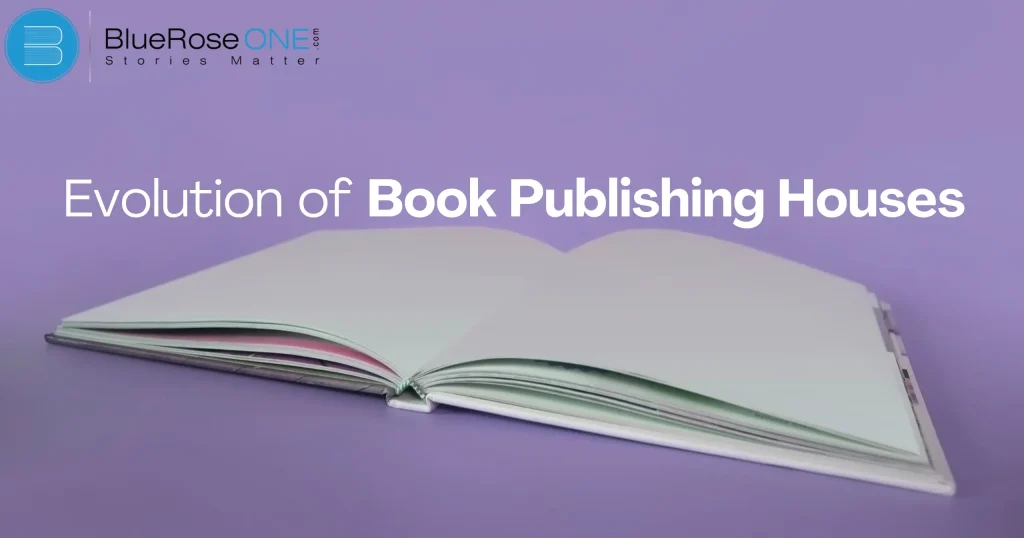
The Evolution of Book Publishing Houses: From Traditional to Independent
Over the years, publishing firms have played a crucial role in the broad landscape of literature. A paradigm shift in the publishing industry has occurred, with independent publishers emerging and established publishing giants losing their hegemony due to shifting consumer preferences and technological improvements. Introduction to Book Publishing Houses As a medium between writers and readers, book publishing houses curate, produce, and disseminate literary works to a broad audience. These houses have historically had a great deal of influence over the content that was released onto the market. Traditional Publishing: The Legacy of Big Houses Historical Background The history of book publishing enterprises is deeply ingrained in the landscape. For centuries, the literary world has been formed by traditional publishing, which is best represented by the history of large houses. Reputable brands like Simon & Schuster and HarperCollins have been mainstays of the publishing industry since the printing press was invented. These titans have selected and published literary works that have endured as touchstones in culture. Their lasting impact has created the groundwork for the development of book publishing, enabling independent presses to flourish and carve out distinct markets in a constantly shifting and dynamic industry. Role of Traditional Publishing Houses Traditional publishing houses are pillars of the literary world, firmly rooted in the ever-changing literary scene with their rich history and unmatched knowledge. For a considerable amount of time, these publishing houses have served as the guardians of literary achievement, carefully selecting and fine-tuning their editorials to create a literary environment. Traditional publishing houses are the cornerstone of literary culture, providing authors with the visibility and legitimacy that come with their prestigious labels while also nurturing up-and-coming writers and supporting established voices. These ancient establishments continue to play an indispensable part in the industry’s past, present, and definitely future—even in the face of the emergence of independent publishing channels. Pros and Cons Within the dynamic realm of book publishing houses, the historical impact of established titans bears witness to the industry’s extensive past. Unquestionably, traditional publishing has advantages over other forms of publication, including superior distribution networks, strong marketing support, and the prestige of being linked to well-known imprints. For aspiring writers, navigating these enormous establishments can be difficult, with lengthy wait times and little creative freedom. With self-publishing offering more liberty and larger income, authors discover liberation as the sector moves towards independence. However, independent publishing lacks the traditional houses extensive resources and well-established reputations. In the ever-changing world of book publishing, authors looking for the ideal fit for their literary journeys must carefully consider the advantages and disadvantages of traditional versus independent publishing channels. You may also like: Online Books vs. Traditional Books | Pros and Cons The Rise of Independent Publishing Unlike the conventional approach, independent publishing has become more popular, giving writers the ability to steer their own literary careers. Definition and Characteristics Within the always-changing publishing landscape, book publishing houses are essential to the shaping of the literary world. These houses have historically been associated with well-established titans who had enormous control over the content that made it into readers’ hands. But a new paradigm has arisen as independent publishing has grown. Independent publishing businesses are known for their inventiveness, adaptability, and commitment to specialized markets. They reject the standard gatekeeping paradigm, giving a forum to a range of voices and non-traditional stories. This change signals the beginning of a creatively vibrant period that gives writers never-before-seen chances to tell their stories to a global audience. Advantages and Challenges Within the ever-changing publishing landscape, the emergence of independent publishing houses represents a dramatic departure from conventional approaches. There are many benefits that these smaller, more nimble businesses have over their larger counterparts. Authors that work with independent publishers frequently get more creative freedom, quicker release dates, and larger compensation. Furthermore, they cultivate a feeling of camaraderie and customised assistance for authors, promoting a range of perspectives and specialised fields. Nevertheless, despite these benefits, independent publishers still have particular difficulties. Having fewer resources, fewer distribution channels, and less market exposure can make it difficult to reach more people. Notwithstanding these challenges, independent publishing’s appeal is only increasing, signalling a shift in the way the literary world views itself. You may also like: The Digital Frontier – How Technology is Reshaping the Literary World Technology and the Changing Landscape Impact of Digital Revolution The digital revolution has had a profound effect on the dynamic world of book publishing houses, changing old paradigms and empowering independent actors. The publishing industry has become more democratic because of technology, which allows smaller companies to compete globally. The days of big companies controlling all distribution channels are long gone. These days, independent publishers have discovered their niche and are addressing a variety of audiences with agility and innovation, thanks to the growth of e-books, print-on-demand services, and social media marketing. This development highlights the significant influence of technology on the conventional model and ushers in a time when accessibility and inventiveness are paramount. Self-Publishing Platforms Technology has caused a revolution in the ever-changing world of book publishing businesses, bringing in the age of self-publishing platforms. These platforms provide writers unparalleled control over their works of literature and provide a direct path to audiences without the need for the conventional gatekeepers. Self-publishing has become more popular, allowing authors to avoid the difficult process of landing a deal with a major publishing business. Alternatively, they can take advantage of the powerful distribution networks and user-friendly interfaces that sites like Smashwords and Amazon Kindle Direct Publishing offer. This represents not only a procedure change but also a democratisation of the publishing sector, where innovation flourishes outside of established frameworks. You may also like: Book Writer | 10 Must-Read Tips for Aspiring Book Writers The Empowerment of Authors Creative Control and Flexibility The empowerment of authors is at the core of the shift occurring in the book publishing industry. The increased focus on artistic control and flexibility is one important factor causing this…
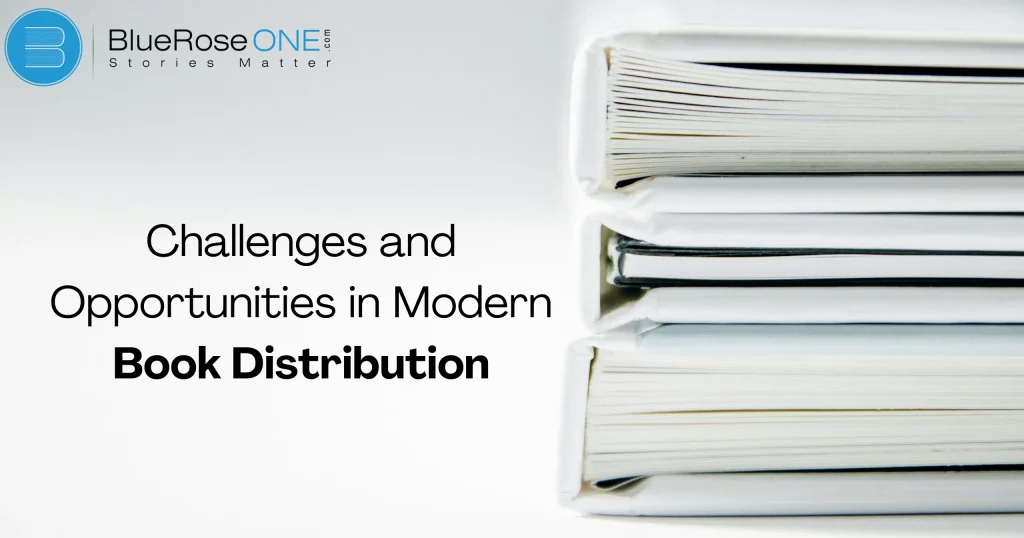
Challenges and Opportunities in Modern Book Distribution
The book distribution environment has changed significantly in the current digital era. There are now many digital platforms and online shops in addition to the conventional ways of book distribution through physical storefronts. The difficulties and possibilities brought about by these adjustments are examined in this essay. Challenges in Modern Book Distribution Competition from Online Retailers One of the biggest obstacles in the current distribution market is the intense competition from internet sellers. The rise of digital platforms and e-commerce behemoths has made it harder for traditional brick-and-mortar bookstores to stay in business. Because online buying is so convenient and offers a wide selection of titles at your fingertips, more and more consumers are choosing to shop online. In order to stay relevant in a market that is changing quickly, distributors must adjust their strategy in response to this transformation. In order to successfully navigate this competitive landscape and guarantee the ongoing vitality of book distribution in the digital age, it is imperative that novel technologies be embraced, data analytics be utilized, and strategic alliances be fostered. Logistics and Transportation Issues in Book Distribution Modern logistics and transportation present both considerable opportunities and challenges in the distribution space. A careful balance between speed, economy, and environmental sustainability is necessary to deliver books from publishers to readers in an efficient and sustainable manner. The emergence of online purchasing and the growth of e-commerce behemoths have made traditional brick and mortar bookstores extremely competitive. In order to optimise the distribution process, from warehouse to last-mile delivery, this dynamic terrain calls for creative solutions. Using cutting edge technologies such as automated warehouses and route optimisation software can boost productivity and cut expenses, guaranteeing that books are delivered to eager customers at a reasonable price. Opportunities in Modern Book Distribution Digital Distribution Platforms Digital distribution systems have transformed book distribution in the ever-changing publishing industry, providing never-before-seen prospects for both publishers and writers. These platforms function as online markets that link authors with a diverse worldwide readership. Authors can now transcend the boundaries of time and geography by connecting with readers on different countries with only a click of a mouse. Furthermore, independent writers can now compete on an even playing field with big publishing organizations thanks to digital distribution networks. These platforms provide a wide range of formats, including audiobooks and ebooks, to meet the varied tastes of modern readers. Accepting these platforms opens up a world of opportunities for writers trying to make their way through the ever-changing landscape of contemporary book distribution. Direct-to-Consumer Models Direct-to-consumer approaches provide publishers and authors a new path in today’s book distribution scenario. Through direct communication with readers, authors can establish stronger relationships than through traditional intermediaries like internet retailers or physical bookstores. This gives you more control over pricing and marketing tactics in addition to streamlining the distribution process. Personalized interactions and customized experiences are made possible by utilizing direct-to-consumer channels, which promotes increased engagement and brand loyalty. Adopting these approaches can transform the way books are read in the increasingly digital world, bringing about a dramatic change in the publishing industry’s dynamics. Global Reach through Online Channels The book distribution industry has changed significantly in the current digital era, providing writers and publishers with hitherto unseen chances to increase their worldwide reach through internet platforms. The entry hurdles have drastically decreased with the introduction of social media, digital publication platforms, and e-commerce platforms. Thanks to these methods, authors can now reach readers around the globe and beyond regional boundaries with their publications. This change offers a more efficient and economical way to distribute books in addition to reaching a larger audience. By embracing these digital channels, authors can open up new opportunities for success in the digital marketplace and gain the tools they need to overcome the current obstacles associated with book distribution. Technological Advancements in Book Distribution Role of AI and Data Analytics Modern book distribution is undergoing a revolution thanks to technology improvements, with artificial intelligence (AI) and data analytics playing key roles. Distributors can now obtain profound insights into consumer behavior, tastes, and market trends thanks to these technologies. Distributors can predict demand trends, optimize supply chains, and expedite inventory management by utilizing AI algorithms. Distributors can now better personalize their offerings to readers’ changing demands thanks to data analytics, which also improves decision-making processes. Utilizing AI and data analytics is essential for maintaining competitiveness and optimizing book distribution efficiency in a time when digital platforms rule the market. Automation in Inventory Management Technological developments have transformed inventory management in the ever-changing book distribution landscape, transforming the industry’s efficiency and scalability. Automation is essential since it streamlines the entire process, from ordering to delivery. Using AI-powered algorithms and advanced inventory management systems, book distributors can reduce waste, forecast demand swings, and maximize stock levels. Decision-makers are better able to plan ahead thanks to real-time data analytics, which guarantees that the appropriate books are available on the shelves at the appropriate times. Adopting automation increases client satisfaction by guaranteeing timely delivery of needed titles and improves operational agility. Utilizing automation in this digital age is not only a wise decision, but also essential to maintaining competitiveness in the quick-paced book distribution industry. Enhanced Customer Targeting and Personalization Modern book distribution has changed dramatically as a result of technology breakthroughs, changing how publishers interact with their readership. In the current digital era, improved client targeting and personalisation are essential tactics. With the use of advanced data analytics and AI-powered algorithms, publishers can now explore the preferences, behaviours, and demographics of their audience in great detail. This makes it possible to create customised marketing strategies that suggest the ideal book to the ideal reader at the ideal moment. Book distributors may increase consumer happiness and loyalty by utilising personalised recommendations and targeted messaging, which will ultimately lead to growth and success in the fiercely competitive book distribution business. Changing Consumer Behavior in Book Distribution Preference for E-books and Audiobooks The shift in consumer…
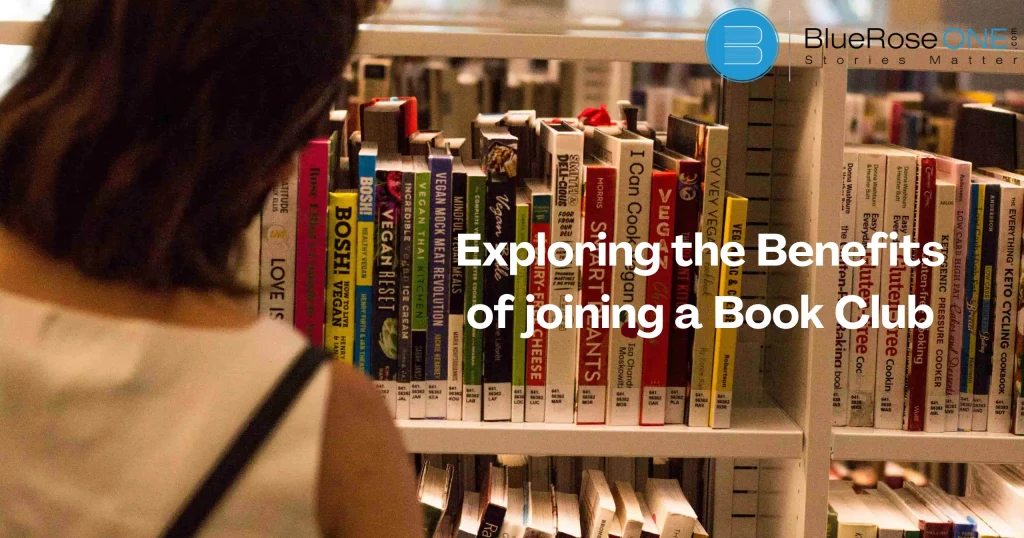
Exploring the Benefits of Joining a Book Club
Both casual readers and bibliophiles might find refuge in the conventional book club, especially in today’s fast-paced world where technology frequently takes over our free time. It’s now simpler and more convenient than ever to join a book club thanks to the growth of internet forums and digital communities. The advantages of taking part in a book club, however, go much beyond the ease of online meetings and the books themselves. Social Connections and Community Fundamentally, a book club is an assembly of people who are brought together by a common love of books. Through their shared passion of reading, book club members create enduring relationships whether they meet in person or virtually. These groups offer a feeling of unity and belonging, resulting in friendships that frequently transcend the world of books. Being a part of a book club provides an invaluable means of social engagement and support in a world when people are becoming more and more alienated. Exposure to New Perspectives and Ideas The chance to read books that are outside of one’s comfort zone is one of the biggest advantages of joining a book club. Book clubs expose members to a variety of concepts and viewpoints by choosing books from a wide range of genres, authors, and perspectives. Readers are forced to examine points of view they might not have otherwise encountered through vibrant discussions and debates, which promotes intellectual curiosity and progress. You may also like: What is Denouement in literature? Definition and Importance Accountability and Motivation to Read Finding the time and enthusiasm to read can be difficult for a lot of people. But becoming a member of a book club offers an integrated support structure that motivates people to stick to their reading objectives. Readers are encouraged to prioritize reading in their hectic schedules by the accountability of group meetings and discussions, which increases their sense of fulfillment and success. Intellectual Stimulation and Personal Growth Participating in literary discussions in a social environment promotes in-depth thought and mental stimulation. Book club conversations encourage critical thinking and intellectual curiosity by having participants analyze themes, characters, and symbolism. Readers develop fresh perspectives and ideas via meaningful discussion and debate, which promotes personal development and self-discovery. Opportunities for Discussion and Reflection Book clubs offer an organized setting for thoughtful discussion and reflection on books in a welcoming setting. Through these conversations, readers can explore the ideas and subtleties of the books they’ve read in greater detail, adding new layers of interpretation and meaning. Members get a stronger appreciation for literature as an art form and a deeper knowledge of the texts by exchanging ideas and insights with other members. You may also like: Query Letter vs. Cover Letter: What’s the Difference? Improved Communication Skills Engaging in book club conversations improves fundamental communication abilities like attentive listening and clearly expressing ideas and viewpoints. Members who have meaningful conversations with one another are more likely to express themselves in a clear and convincing manner, which develops excellent communication skills that are beneficial in both personal and professional contexts. Enhanced Critical Thinking In a book club setting, analyzing literature enhances readers’ critical thinking abilities by enabling them to assess texts critically and develop their own ideas and arguments. Through the analysis of characters, plot devices, and narrative structures, participants get a more profound understanding of the intricacies involved in storytelling and the self-assurance to interact critically with diverse media and data. Diversifying Reading Habits The chance to read a wide variety of books is one of the biggest advantages of joining a book club. Book clubs expose members to fresh and unusual viewpoints by choosing books from a variety of genres, authors, and civilizations. Readers can expand their literary horizons and gain a more sophisticated perspective on the world by venturing beyond their comfort zones and embracing novel genres. You may also read: List of Top 10 Nikita Singh Books of All Time Stress Reduction and Mental Well-being It has long been known that reading can help people relax and escape from the strains of daily life for a little while. By offering a caring group of people who have similar interests, joining a book club improves this experience and allows you to share the pleasures of reading with others. Having meaningful talks and debating books may be very cathartic, lowering stress levels and enhancing mental health. Increased Empathy and Understanding The development of empathy and understanding is one of reading literature’s most significant advantages. Readers gain a greater understanding of the variety of human experiences by delving into the lives and experiences of fictitious characters. Book club discussions encourage participants to think from a variety of angles and develop empathy for characters from other countries and backgrounds, which helps to further improve this process. You may also like: Pulitzer Prize Fiction Winners by Year: A Complete List Conclusion To sum up, there are a tonne of advantages to joining a book club that go well beyond the enjoyment of reading. Book clubs provide readers of all ages and backgrounds a rich and fulfilling experience, boosting social ties and a sense of community, as well as intellectual curiosity and mental well-being. Whether you’re an avid reader seeking to broaden your literary horizons or a seasoned bibliophile, becoming a member of a book club can undoubtedly improve your life in many ways. Frequently Asked Questions How do I find a book club to join? You can search online for local book clubs in your area or join virtual book clubs through platforms like Meetup or Goodreads. Do I have to read every book chosen by the book club? While it’s encouraged to participate fully in book club discussions, you’re not obligated to read every book. Feel free to join the discussion even if you haven’t finished the book. What if I disagree with the opinions of other book club members? Book clubs thrive on lively discussions and diverse perspectives. Respectfully share your own opinions and be open to hearing different viewpoints. Can…
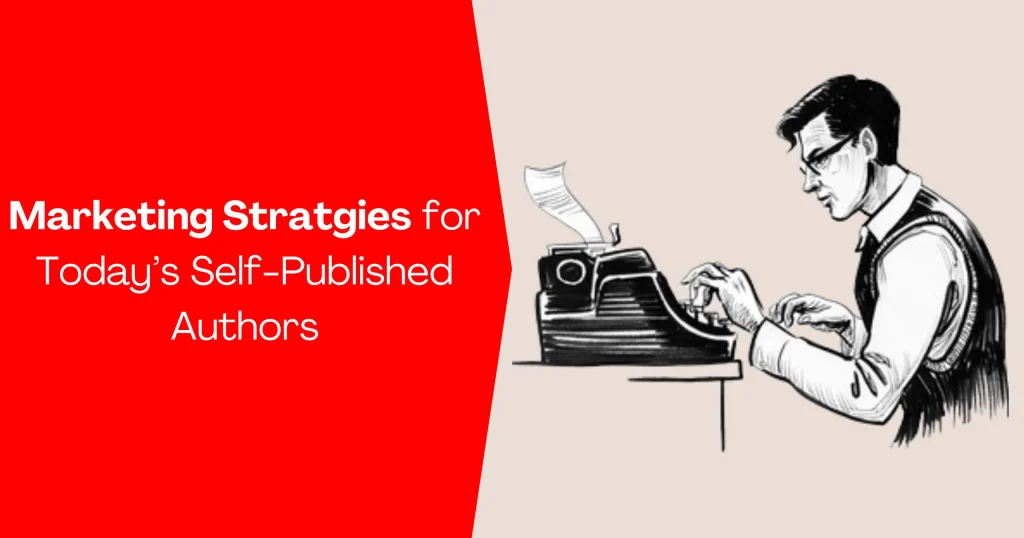
Marketing Strategies for Today’s Self-Published Authors
Introduction to Self-Publishing In the ever-changing world of self-publishing, writers are using creative marketing strategies to increase their visibility and audience. Authors have the freedom to choose their own path as the conventional publishing model changes and digital platforms make access more accessible to all. With the help of customized marketing strategies, self-published authors can now take charge of their publication path and avoid traditional gatekeepers by connecting with their readers directly and sharing their stories with the world. The Rise of Self-Publishing The surge in self-publishing’s popularity owes much to digital platforms such as Amazon Kindle Direct Publishing (KDP), Smashwords, and BlueRose Publishers, enabling authors to reach a global audience sans traditional publishers. For self-published authors seeking visibility, effective marketing strategies are paramount in navigating the crowded literary landscape. You may also like: The Evolution of Book Publishing Houses: From Traditional to Independent Benefits of Self-Publishing Self-publishing has been a game-changer for budding writers in the digital age by providing them with unmatched independence and control over their literary works. The field of marketing strategies is where one of the biggest advantages is found. Self-published writers, in contrast to those who publish through established channels, are free to customize their marketing strategies to fit their particular target market and target audience. Self-published authors can create unique marketing campaigns that connect deeply with their readership by utilizing social media platforms, building email lists, and investigating opportunities for targeted advertising. This degree of personalisation allows writers to flourish on their own terms by fostering real connections and improving exposure in a congested literary scene. Challenges Faced by Self-Published Authors Self-published authors face many obstacles in the cutthroat world of publishing today, chief among them being marketing. Writing interesting stories is only the first step; effective marketing strategies are needed to get such stories seen among the sea of content. Self-publishers do not have the same powerful marketing apparatus that well-established publishing houses do, in contrast to traditionally published writers. As a result, they frequently have few resources and experience and must negotiate the complicated world of marketing alone. To stand out in a crowded market and draw in readers, self-published writers need to constantly invent new marketing strategies, from creating a web presence to utilizing social media platforms wisely. You may also like: Challenges and Opportunities in Modern Book Distribution Understanding Marketing for Self-Published Authors Importance of Marketing Marketing strategies are becoming essential tools for self-published authors looking to carve out a position in the literary world in today’s competitive scene. Success depends on developing winning marketing plans that are specific to their target market and distinctive voice. To increase their reach and engagement, self-published writers need to use a combination of traditional and digital marketing strategies. An author’s brand can be developed and visibility and book sales increased with the appropriate marketing strategy, which includes using social media platforms. Self-published authors can better negotiate the complexities of the publishing industry and establish a closer connection with their public by implementing creative marketing methods. Target Audience Identification One of the first steps in developing a marketing strategy is identifying the target audience for your book. Success in the ever-changing realm of self-publishing requires a solid understanding of marketing strategies. Identification of the target audience is the first step in each author’s marketing campaign. For today’s self-published authors, creating profoundly resonated marketing campaigns requires a thorough awareness of their readership demographics. Through the use of techniques such as social media analytics, email subscriber statistics, and reader surveys, writers are able to identify the preferences, buying habits, and areas of interest of their intended readership. With this knowledge, they may improve their marketing strategies to reach their target audience with the most possible impact and interaction. Branding and Platform Building For self-published writers, successful marketing strategies are essential in the ever-changing publishing landscape of today. Creating a powerful platform and brand is essential to being noticed in the crowded content market. Self-published authors can increase their visibility and establish a more meaningful connection with their target audience by utilizing creative marketing strategies. Astute writers know that building a consistent brand identity is essential to drawing in readers and increasing book sales, whether they do this through developing a lively social media presence, joining forces with like-minded businesses, or utilizing email marketing. You may also like: Exploring the Benefits of Joining a Book Club Effective Marketing Techniques Utilizing Social Media Platforms Authors who self-publish are always looking for unique ways to stand out in the crowded publishing market of today. Using social media platforms has become one of their most effective strategies. Facebook, Instagram, Twitter, and other social media platforms provide writers with unmatched chances to engage with their readers through tailored advertising choices and a wide audience base. Buzz about their work can be created and fans captivated by interesting content, like interactive Q&A sessions, book trailers, and behind-the-scenes looks. Through the judicious use of social media, self-published authors can augment their visibility, draw in new readership, and finally attain success in the always changing publishing landscape. Content Marketing Strategies Marketing tactics are essential for self-published authors to succeed in the current digital environment and carve out a niche amidst the deluge of content. Strategic success is mostly dependent on developing persuasive marketing strategies that are specific to their offers. One effective strategy is content marketing, where writers may use their experience to produce worthwhile, interesting content that appeals to their target demographic. Self-published writers can carefully establish themselves as authority in their subject through engaging social media campaigns and thought-provoking blog articles, which will draw devoted readers and increase book sales. Through the effective use of content marketing, writers can reach a wider audience and achieve more success with their works. Email Marketing Campaigns Marketing strategies are becoming essential tools for self-published authors who want to succeed in the modern digital world. Email marketing campaigns are one of the most effective ways to engage readers and increase book sales among the…
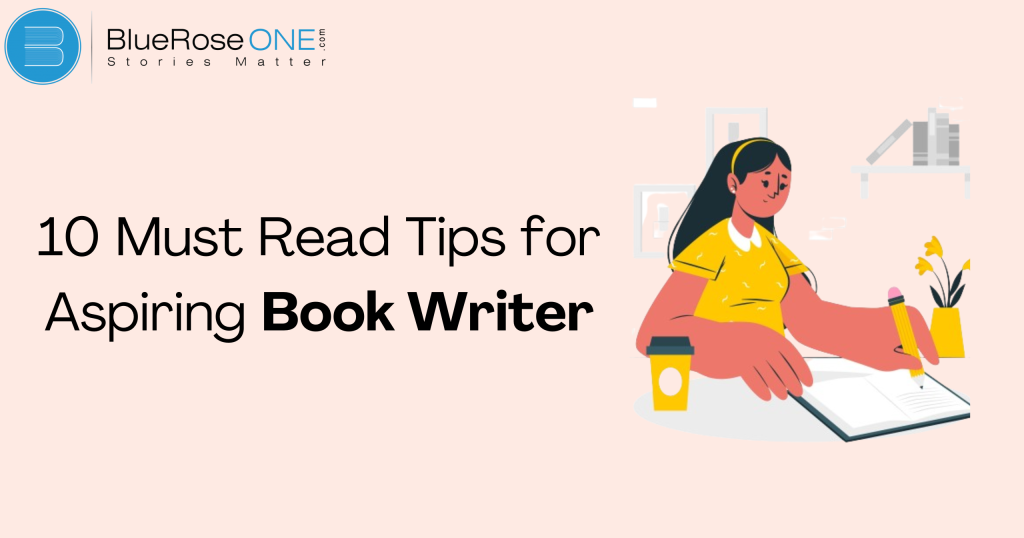
Book Writer | 10 Must-Read Tips for Aspiring Book Writers
Writing a book is a dream shared by many, but for aspiring book writers, the journey from idea to publication can be daunting. However, with dedication, perseverance, and the right guidance, turning that dream into reality is entirely possible. In this article, we’ll explore ten essential tips that every aspiring book writer should know to navigate the writing process successfully. Here’s the list of ten tips for aspiring writers. Tip 1: Define Your Audience Tip 2: Read Widely Tip 3: Write Regularly Tips 4: Set Realistic Goals Tip 5: Embrace Failure Tips 6: Edit Ruthlessly Tips 7: Seek Feedback Tips 8: Join Writing Communities Tips 9: Learn the Craft Tips 10: Presevere Conclusion Tip 1: Define Your Audience Knowing your audience is crucial in the wide world of writing, especially for aspiring book writers. Give careful thought to who your target readership is before you start writing. Who do they represent? What are their passions, challenges, and areas of interest? Focusing on your intended audience will help you craft material, tone, and writing style that will appeal to them on a deep level. Knowing your audience’s tastes will guarantee that your work engages and connects with them deeply, whether they are romance fans or fantasy fans seeking epic adventures. Thus, go inside your readers’ thoughts and create tales that will compel them to turn the next page. Tip 2: Read Widely “Read widely” is a golden rule for aspiring book writers. Reading a wide range of literature improves your writing abilities and expands your literary horizons. Immersion in a variety of genres, styles, and voices as a book writer provides priceless insights into narrative structures, character development, and storytelling approaches. Whether you read classic books or modern bestsellers, every page you turn will reveal fresh ideas and inspirations that will spark your imagination and help you develop your own writing style. Thus, remember this crucial advice as you embark on your career as a book writer: read widely since there are lessons to be learnt in every book. Tip 3: Write Regularly Being consistent is essential to become a good book writer. Writing frequently is one of the most important pieces of advice for emerging book writers. Writing consistently helps you hone your art and maintains your creative juices flowing, ready for inspiration. Making a pattern, whether it be a set word count target for each day or timed writing sessions, can keep you motivated and focused on your task. Keep in mind that getting on the paper is half the fight won, especially on the days when inspiration seems elusive. Thus, commit to writing on a daily basis and observe how your literary aspirations materialize. Tip 4: Set Realistic Goals Achieving success as a book writer requires defining and achieving attainable goals. It takes commitment to create your literary masterpiece, but you must be careful not to set yourself up for failure by having high expectations. To begin, divide your ultimate objective of finishing a book into achievable steps, such as creating chapter summaries or establishing daily word counts. This strategy guarantees consistent advancement towards your goal of being a published author while also keeping you inspired. Remember, neither Rome nor a best-selling book were created overnight. Maintain your motivation and focus, and your literary goals will eventually come to pass. Tip 5: Embrace Failure Aspiring book writers view failure as a springboard for development rather than an obstacle on their path. Accepting failure is a necessary part of developing your craft and skill set. Every manuscript rejection, critique, and obstacle is a chance to grow, change, and get better. Setbacks shouldn’t deter you; instead, use them as motivation to keep moving forward. Recognise that failure is a vital component of your journey rather than its conclusion. Accept it, draw lessons from it, and use it to inform your future writing. In the realm of novel writing, failing is a badge of perseverance and dedication rather than a sign of weakness. Tip 6: Edit Ruthlessly One crucial piece of advice for prospective book writers is paramount: edit ruthlessly. It’s a philosophy, not merely a matter of polishing text. Every word and every statement has a purpose. Removing extraneous details improves the story’s coherence, draws readers in, and enriches the narrative. Accept the subtraction method and apply merciless redundancy. Recall that accuracy takes your work from decent to outstanding. Use your red pen with commitment to shape your manuscript into its best version during the editing phase. Gaining proficiency in this area sets you apart from the pros and helps your book stand out from the crowd of other wannabe writers. Tip 7: Seek Feedback Getting feedback is essential on the path to becoming a successful novelist. Positive critique illuminates the way forward and serves as a beacon of guidance. Future book writers ought to welcome criticism as a tool for improving their work. Every viewpoint, whether it comes from editors, beta readers, or other writers, is insightful. Accept the feedback loop and use criticisms as a chance to improve. Recall that even seasoned writers used to ask for criticism on their initial versions. Crafting great stories is the result of an ongoing cycle of improvement. So, welcome criticism with open arms; it’s the key to becoming a literary sensation among authors. Tip 8: Join Writing Communities Writing groups are a huge game-changer if you want to improve your craft and find support for yourself as a book writer. These dynamic hubs provide priceless tools, criticism, and support that can help you take your skill to new heights. Making connections with other book writers not only promotes a feeling of solidarity but also introduces you to a variety of viewpoints and writing styles. These networks are rich sources of inspiration, whether you use them for exchanging ideas, taking part in writing contests, or looking for guidance on difficult story turns. Accept the creative force of the group and see your writing soar! Tip 9: Learn the Craft For those…
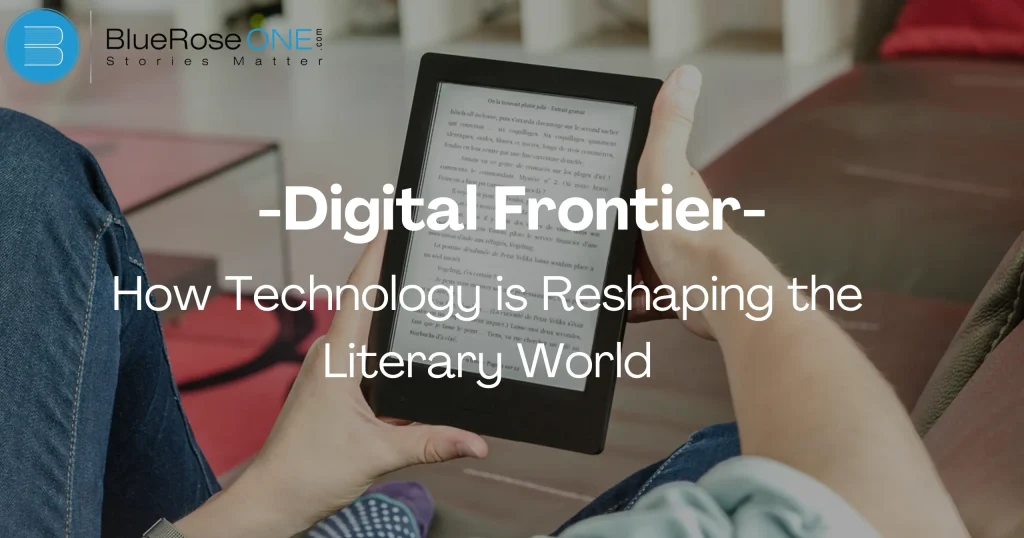
The Digital Frontier – How Technology is Reshaping the Literary World
The literary world is not exempt from the revolutionary effects of technology in the current digital era, which has revolutionised every aspect of existence. Significant disruptions to the traditional publishing and storytelling landscape have made room for new media and never-before-seen opportunities for both writers and audiences. Introduction to the Digital Frontier – Literary World In the quickly changing digital world of today, the literary world is changing dramatically. New technologies have not only completely changed the way we read, but they have also created previously unheard-of opportunities for creativity and teamwork. Digital platforms, such as e-books and audiobooks, have made literature more accessible to a wider audience by enabling readers to quickly explore a variety of genres and writers. Furthermore, the borders between interactive multimedia experiences and traditional literature are becoming increasingly hazy as a result of writers’ experimentation with novel storytelling styles made possible by digital tools. We are about to set off on a trip where creativity and technology come together to alter the literary landscape as we enter the digital frontier. You may also like: Falling Action: Definition, Examples and More E-books and Digital Reading Platforms The emergence of e-books is one of the biggest trends in the literary world. These digital versions of conventional print books provide readers with a level of accessibility and convenience never before possible. People may now read books anytime, anywhere, thanks to the widespread use of e-readers and mobile gadgets, which allow them to carry entire libraries in their pockets. Well-known e-readers like the Amazon Kindle, Apple Books, and Google Play Books have further transformed how readers find and interact with books. Users’ reading experiences are improved by these platforms’ capabilities, which include syncing between devices, built-in dictionaries, and customisable fonts. You may also like: The Rise of Shakti by Megha Dinesh: Book Review Self-Publishing and Online Communities In the expansive landscape of the literary world, self-publishing and online communities have emerged as revolutionary forces, fundamentally altering the traditional paradigms of publishing. Aspiring writers today have unparalleled access to a global readership, overcoming the limitations of conventional gatekeepers, thanks to technological breakthroughs. Online communities are dynamic gathering places for writers to interact, exchange ideas, and build strong support systems. Through self-publishing, writers can forego traditional publishing channels and take charge of their artistic careers. By democratising access to literature and amplifying various voices, the digital frontier encourages innovation and ushers in a new era of literary inquiry and expression. You may also read: Quilbot Review: Can It Really Improve Your Writing in Literature? Audio Books and Podcasting Technology has changed the literary world and brought about a dynamic shift in the way we consume content in today’s fast-paced society. The way stories are told and heard has changed dramatically because of the innovations of podcasts and audiobooks. For people who are always on the go, these platforms provide a means of accessing literature and engrossing themselves in gripping stories. Whether it’s exploring the depths of classic literature or discovering new voices in fiction, audio books and podcasts provide an accessible platform that transcends traditional barriers. As technology continues to evolve, the digital frontier promises to reshape the literary world, making storytelling more engaging and inclusive than ever before. Interactive Storytelling and Augmented Reality The combination of storytelling and augmented reality (AR) is driving a significant revolution in the literary world in the digital age. Within the context of augmented reality, interactive storytelling provides a more immersive experience than standard narratives. With augmented reality (AR), readers take on a new role as active participants who navigate through richly detailed worlds where settings and characters come to life. In addition to enhancing the reading experience, this lively exchange creates new opportunities for creativity and inquiry. The horizons of literature are expanding as technology advances, beckoning readers to go on engrossing adventures where their imaginations are limitless. Artificial Intelligence and Writing Assistance Artificial intelligence (AI) is transforming the literary world in the era of digital growth by providing unmatched writing support. This game-changing technology has emerged as a vital resource for authors, offering priceless assistance in developing gripping stories, polishing prose, and even coming up with original ideas. With the help of advanced language models and automatic grammatical checks, artificial intelligence (AI) is improving writing productivity and originality worldwide. AI-powered writing support is not just changing the literary scene as we traverse the digital frontier; it is also rewriting the fundamental nature of storytelling in the current day. You may also like: Fatal Flaw: Definition, Types, Examples and More Social Media and Author Engagement Social media is a revolutionary force in the literary world, changing the way authors interact with their readers in an ever-changing context. Thanks to social media sites like Twitter, Instagram, and TikTok, authors can now share their thoughts, short clips from their works, and behind-the-scenes looks at their creative process virtually. Authors can create a feeling of community and conversation by strategically using hashtags, live chats, and interactive polls, which can help them bridge the gap with their readers. Technology is a potent tool in this digital age and literary world for connecting people and amplifying voices, which enhances the literary experience for both readers and producers. Data Analytics and Reader Insights Data analytics appears to be a revolutionary force in the literary world, providing hitherto unheard-of insights on reader behaviour and preferences. The way we read literature is changing along with technology. Every interaction—whether with audiobooks or e-books—leaves a digital trail that may be examined in detail. Publishers and authors may both use advanced algorithms and machine learning to identify patterns and determine what most interests readers. In the ever-expanding digital frontier of the literary world, this abundance of data not only impacts marketing strategies but also the creative process itself, establishing a symbiotic interaction between writers and their audience. Challenges and Opportunities in the Digital Age The literary world is at a crossroads in the digital age, handling both enormous potential and problems. With only a few clicks, readers may…
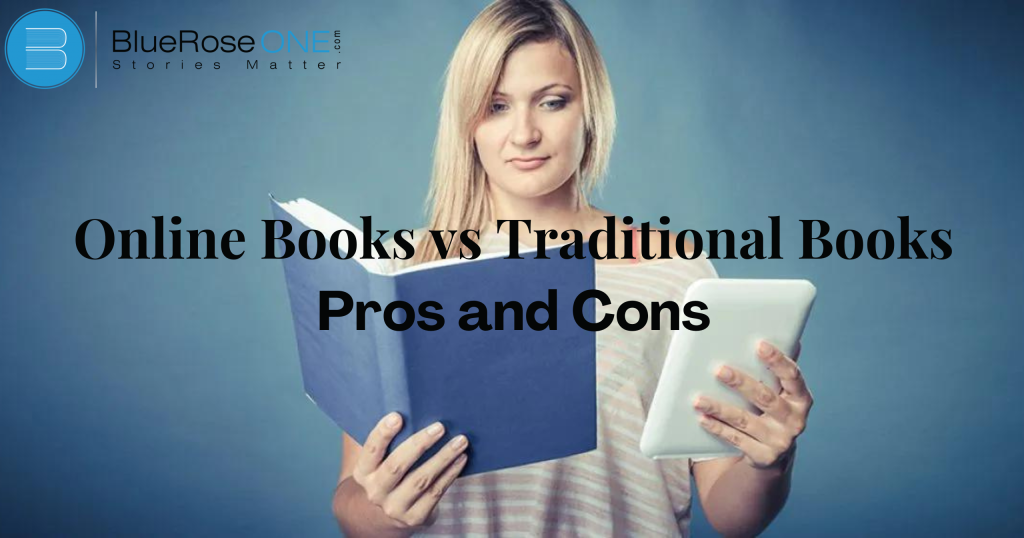
Online Books vs. Traditional Books | Pros and Cons
The age-old argument between traditional books and online books is still important when it comes to reading literature. Both formats have special benefits and downsides to suit various tastes and lifestyles. Let’s examine the advantages and disadvantages of each to determine which choice best suits your values and reading preferences. You may also like: What is Historical Fiction? Definition, Characteristics and Impact Convenience Access: Convenience is king in today’s fast-paced society, and the argument between traditional books and online books format are becoming more and more heated when it comes to book access. The physical experience of traditional books is enhanced by the scent of ink permeating the air and the feel of crisp pages beneath your fingertips. On the other hand, it is impossible to ignore how accessible internet books are. You can access a huge library at any time, from any location, with just a few clicks. The convenience of reading books online outweighs the limitations of hard copy versions, whether you’re reading them while driving or relaxing at home.Online books triumph in the convenience department, offering unmatched accessibility when compared to print literature. Portability: When comparing online books to print books, portability is a crucial consideration in terms of convenience. Traditional books have a tactile charm with their clean pages and comforting smell, but they are often difficult to move due to their heft. On the other hand, online books offer a solution that is suited for contemporary lifestyles, easily integrating with digital devices such as tablets and smartphones. Because they are small, online books provide you with continuous access to your favorite novels whether you’re reading while traveling by train or relaxing on the beach. Online books redefine convenience by embracing portability and giving readers the flexibility to immerse themselves in reading whenever and wherever they choose. You may also like: 10 Must-Have Apps for Accessing Digital Books Anywhere Cost Initial-cost: There are significant variations in the upfront costs of buying books between traditional and online books. The initial cost of traditional publications is frequently higher because of things like printing, shipping, and distribution expenses. Plus, the cost of buying new hardcover volumes can mount up quickly. However, because they can be accessed through subscription services and are available in digital formats, online books are usually a more affordable option. Many readers, especially those on a tight budget, may find online books to be a more affordable option as a result of this substantial initial cost reduction. Long-term Cost: Long-term costs must be taken into account when assessing the cost of reading materials. Although traditional books may initially appear more affordable, their expenses can mount up over time. Physical books need room to be stored, which could result in extra costs for storage boxes or bookshelves. In addition, deterioration can call for replacements, raising the overall cost. On the other hand, books purchased online frequently have lower initial costs and don’t require physical storage. Furthermore, digital copies are less likely to require replacement because they don’t deteriorate with time. Because of this, even if traditional books might seem more affordable at first, online books end up being a more affordable option when taking into account overall costs. You may also like: 10 Effective Strategies to Improve Your Reading Habits Reading Experience Tangibility: Tangibility is important when it comes to the reading experience, especially when contrasting printed books with digital versions. The tactile experience provided by traditional books enables readers to turn pages, smell ink, and feel the weight of the book in their hands. This concrete encounter strengthens the reader’s bond with the book and improves their reading experience as a whole. Online books, on the other hand, allow readers to have the convenience and accessibility of having a whole library in their pocket. Their absence of the sensory immersion that traditional books offer, however, makes the decision between the two dependent on lifestyle and personal taste. Digital features: A wealth of digital elements that reinvent the reading experience have been brought about by the digital age, in the ever-evolving landscape of literature consumption. The tactile quality of a paperback or hardcover, the sound of pages turning, and the distinct smell of ink on paper are what appeal to traditional book lovers. The digital sphere, on the other hand, has its own set of benefits that are changing the way we interact with content. Online books are convenient because they can be accessed instantly from any device, have customisable font sizes for better readability, and have interactive features like multimedia integration and hyperlinks that make for an engaging narrative journey. Whether you favor the dynamic possibilities of reading on the internet or the timeless appeal of traditional books, each offers special advantages to enhance your literary experience. You may also like: Too Good To Be True a by Prajakata Koli Health implications Eye strain: Extended screen time has “health implications” that are noteworthy, especially when it comes to reading. Eye strain is a typical side effect that is frequently made worse by the rise in popularity of online reading. Online books cause digital eye strain since it necessitates extended screen time, in contrast to traditional books, which provide a physical experience. The constant need to gaze on a glowing screen can create headaches and blurred vision, and the blue light released by displays can disturb sleep patterns and cause discomfort. While both print and digital books offer advantages, while making a decision between the two, it’s important to take the potential effects on eye health into account. Screen-time: Screen time has become a major worry in the era of digital dominance, particularly when it comes to reading. Reading traditional books encourages healthy behaviors and lessens eye strain while providing a break from excessive screen time. Interacting with physical pages promotes improved posture and reduces the negative consequences of extended screen time. On the other hand, despite being easily accessible and convenient, online books increase screen time, which may result in digital eye strain and irregular sleep patterns….
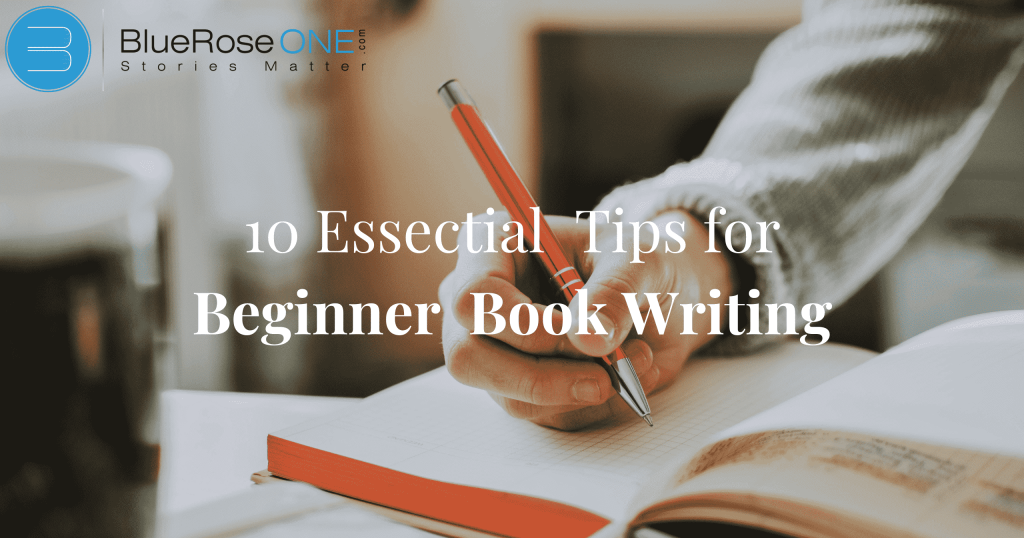
Book Writing | 10 Essential Tips for Beginner Book Writing
Introduction Embarking on the journey of book writing a book can be both exhilarating and daunting for beginners. Whether your goal is to write a non-fiction piece, memoir, or novel, navigating the complexities of the writing process takes commitment and careful planning. We’ll look at ten crucial pointers in this post to help aspiring authors succeed in the literary world. Find Your Writing Space uncovering your perfect writing place is like uncovering a treasure trove when it comes to book writing. Your creativity and productivity can be significantly impacted by your surroundings. Start by experimenting with different environments, such as a quiet park bench, a busy café, or a quaint spot at home. Try out various atmospheric conditions until you discover one that piques your interest. Always keep in mind that your working area should be a haven designed to suit your needs, devoid of outside distractions, and brimming with ideas. You provide the groundwork for the success of your writing endeavors by defining this holy area. You may also like: Marketing Strategies for Self Published Novels | Get Noticed Set Achievable Goals Setting attainable goals serves as the compass that leads all prospective writers through the huge sea of invention in the exciting voyage that is book writing. When you set out on your literary journey, don’t forget to divide your overall objective of finishing a book into achievable milestones. Each step you take towards realizing your goal of being a published author, whether it’s planning out chapters, creating daily word counts, or dedicating specific writing periods, will help you get there. Setting attainable goals helps you stay on track and celebrate your accomplishments, which will rekindle your enthusiasm and dedication to finishing your book. Develop Your Characters When it comes to writing books, creating characters that people will want to read about is crucial. Every character should be carefully developed, with depth, weaknesses, and goals that your audience can relate to. Describe their goals, history, and character attributes first in order to develop multifaceted characters that readers can relate to on an emotional level. As the story progresses, demonstrate their development by letting them overcome obstacles and change naturally. Keep in mind that your book’s characters are its heart and soul since they propel the plot forward. By investing effort in their development, you may create a story that draws readers in and holds their attention throughout. Outline Your Plot Writing a successful novel starts with developing an engaging plot. Plot out your story in detail before you start writing your novel. This story map will help you navigate the turns and turns of your story, maintaining continuity and drawing readers in from beginning to end. Start by jotting down important story points and character arcs, and then arrange them into a well-organized framework. In addition to streamlining your writing process, this blueprint gives you direction and focus as you write your book. Make an investment in this fundamental stage, and observe how your story takes on a clear, purposeful development. You may also like: 5 Key Steps to Successfully Self Publishing Your Novel Write Regularly Writing consistently is a fundamentally important component of book writing success. Maintaining consistency is crucial while starting the process of writing a book. Aspiring writers can overcome writer’s block and procrastination by committing to writing on a regular basis and creating a routine for themselves. Frequent writing sessions help someone develop discipline and gradually improve their craft. Making meaningful progress on your book-writing journey requires you to maintain a consistent writing habit, whether that means setting weekly writing objectives or allocating a specified period each day. Seek Feedback Getting feedback is a vital tool that helps new writers navigate the complex world of book writing and find their way through the dense prose. As a beacon, constructive criticism highlights blind spots and improves story arcs. Accept criticism as an essential tool that will help you turn unpolished drafts into polished works of art. Every viewpoint—whether from mentors, beta readers, or writing groups—adds a level of understanding that is essential for development. Take criticisms positively and use them as a springboard for writing greatness. In the world of book writing, criticism is not only helpful—it is indispensable. Revise and Edit It is impossible to overestimate the significance of editing and revising when producing a book. This is the part of the manuscript where it starts to really shine. Through revision, you may polish your concepts, write more concisely, and make sure your story makes sense from beginning to end. The goal of editing, on the other hand, is to make your writing look better, correct mistakes, and enhance your punctuation and grammar. These actions taken collectively transform your work from an unpolished draft into a polished masterpiece. Therefore, embrace the editing and revision process—this is the magical part of your journey as a beginning book writer. Stay Inspired Remaining creatively motivated is the compass that directs each word, page, and chapter on the exciting trip that is book writing. The creative fire within a writer is stoked by inspiration, which propels them forward even when the road ahead appears difficult. Nurturing inspiration is crucial, whether it takes the form of taking in the beauty of nature, immersing oneself in engrossing stories, or interacting with other writers. Aspiring writers can foster an environment that is conducive to the growth of their book writing careers by embracing curiosity, partaking in a variety of experiences, and adhering to a strict writing schedule. In the colorful tapestry of storytelling, continuing to be inspired is not only a luxury but also a necessity for any newcomer setting out on their literary journey. You may also like: 10 Effective Strategies to Improve Your Reading Habits Honor Your Advancement When it comes to book writing, you have to respect your progress and see each step as a victory. Recognising your progress as a novice in the huge world of storytelling keeps you motivated and forward motion. Every writing achievement,…
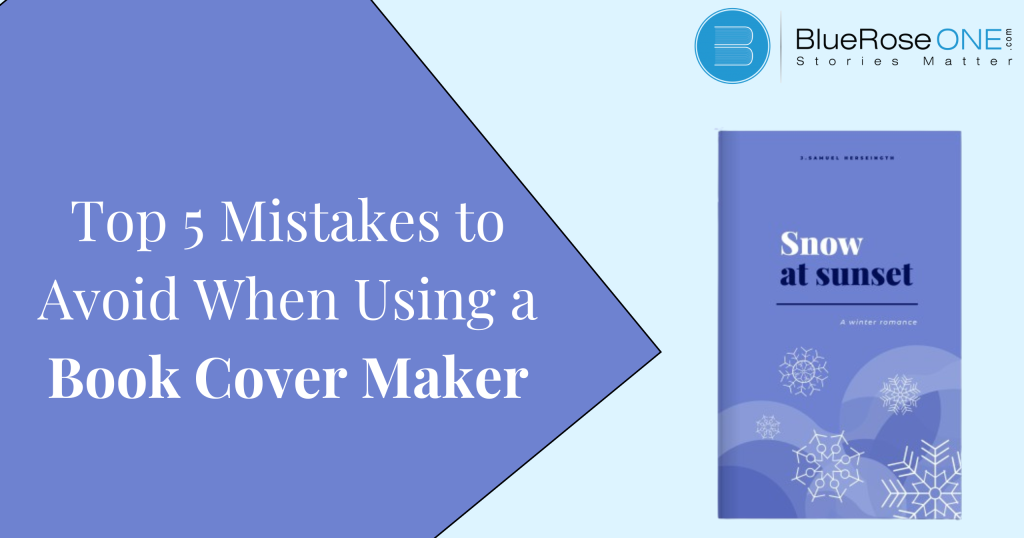
Top 5 Mistakes to Avoid When Using a Book Cover Maker
When it comes to attracting readers’ attention and summarizing a book, book covers are quite important which can be designed with book cover maker. With the rise of self-publishing in the digital age, using book cover makers has grown in popularity. Though convenient, there are several typical faults in book covers that authors should avoid to make sure their work is properly represented and draws in readers. Choosing the Wrong Template Choosing the incorrect template is one of the most frequent errors made while utilizing a book cover maker. The entire look and feel of the cover design is influenced by the templates that form its base. Selecting a template that is at odds with the book’s category or tone will confuse prospective buyers and lessen the book’s appeal. Authors should carefully assess the available templates and take into account elements like genre, target audience, and visual style in order to avoid making this error. It’s important to consider customisation possibilities to make sure the selected template may be adjusted to meet the book’s unique needs. You may also like: 10 Effective Strategies to improve your reading habits Ignoring Branding Guidelines Another common error made by authors is to create their book covers without taking branding requirements into consideration. Maintaining consistency in branding cultivates a recognisable identity and encourages reader loyalty and trust. Branding principles should be followed to avoid a disconnected brand image and to protect the author’s credibility. It is imperative for authors to guarantee that the color schemes, fonts, and artwork used on their book covers are consistent with their overall brand identity. By ensuring uniformity in all promotional materials, writers may bolster their brand awareness and leave a lasting impact on readers. Overcrowding the Design In book cover design, packing the layout with too many elements is a common mistake. Although it could be tempting to pack as much information as you can into a design, cluttered designs can overwhelm readers and take attention away from the book’s main point. When designing their covers, authors should aim for clarity and simplicity, concentrating on the essential components that best express the spirit of the work. When it comes to drawing in readers and conveying the genre or concept of the book, minimalist designs frequently work better. Ignoring Typography Despite the fact that typography is vital to a book cover’s impact, writers frequently ignore it. Bad font selections can take away from the overall aesthetic and make the cover hard to read, which can lead to missed opportunities to draw in readers. When creating book covers, authors should give great thought to typography, choosing typefaces that both fit the topic and improve readability. Finding the ideal ratio of intelligibility to aesthetics can be achieved by experimenting with various font sizes, styles, and layouts. You may also like: The Rise of Audiobooks: A Game-changer for Modern Bookworms Forgetting About Target Audience When creating book covers, authors often make the crucial error of not considering their intended readership. To create covers that appeal with readers and encourage them to investigate deeper, it is imperative to have a thorough understanding of the preferences and expectations of the target population. To find out the preferences, interests, and demographics of their target audience, authors should perform research. Writers can enhance the possibility of drawing in readers and sparking interest in their works by customizing their book covers to appeal to their target audience. Conclusion To sum up, for writers who want to design polished book covers, utilizing a book cover maker might be an easy and affordable option. But in order to get the most out of these tools, writers need to steer clear of frequent blunders like selecting the incorrect template, disobeying branding standards, packing the design with too many elements, ignoring typography, and losing sight of their intended audience. In the cutthroat world of publishing, authors can increase the visibility and appeal of their works by avoiding these mistakes and adhering to best practices in cover design.
